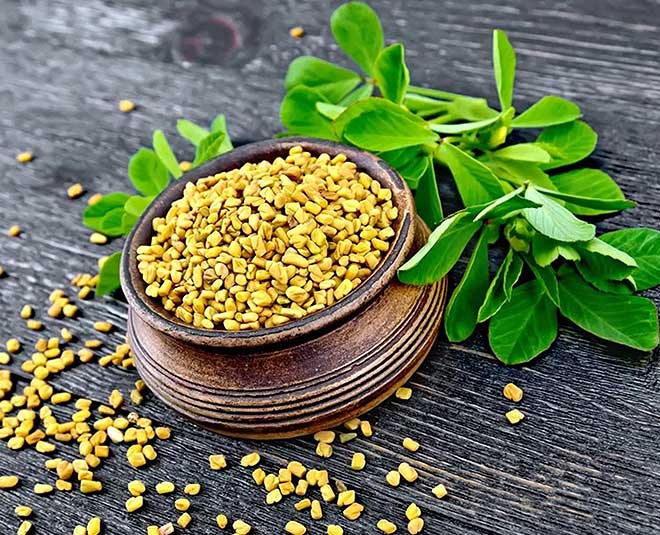Fenugreek herb comes from the same family as that of soy. All its parts, seeds, twigs, leaves, and roots can be used like a spice, supplement, and flavoring agent. Since ancient times, Fenugreek is considered to be helpful for your overall body. However, more studies need to be done to determine the health benefits of Fenugreek.[1]

What is Fenugreek?
A herb similar to that of clover, Fenugreek is mostly found around western Asia, southern Europe, and the Mediterranean region. You can use it for medicines, cooking, and as flavoring agents. It helps to enhance the smell, and the taste appears like maple syrup. Some also consume Fenugreek leaves as a vegetable, especially in South Asian countries like India.[2]
Fenugreek has many problems, such as an upset stomach, inflammation, constipation, and gastritis. Apart from that, it is also helpful for different health conditions such as polycystic ovary syndrome, menstrual cramps, obesity, diabetes, and more. Furthermore, it also offers protection against the hardening of arteries and high blood levels, such as triglycerides and cholesterol.[3]
Fenugreek helps treat a lot of male problems such as hernia, male infertility, and erectile dysfunction. As a result, it is best to improve sexual interest in both men and women. For example, Fenugreek helps in improving milk flow for breastfeeding women.
Since Fenugreek acts like a spicy element, it is used as a flavoring agent in different products like tobacco, beverages, foods, and maple syrup. Therefore, fenugreek extracts may be used for different elements, such as cosmetics and soaps.[4]
Fenugreek, being one of the most useful spices, can help treat many health conditions such as leg ulcers, eczema, gout, and lymphadenitis.
Nutrition in Fenugreek
The nutritional elements of Fenugreek lead to it being a potent antioxidant. Some of the prominent nutrients in Fenugreek include
- Vitamin A
- Vitamin D
- Vitamin B-complex
- Choline
- Biotin
- Soluble and insoluble fiber
- Iron
- Inositol
Uses of Fenugreek
Fenugreek has been used for a long time in Indian and Chinese tradition as a medicinal plant. Fenugreek extracts can be found in a range of products like spice blends, cosmetics, soaps, teas, maple syrup products, and condiments.[5]
What is Fenugreek effective for?
Different researches have shown the effectiveness of Fenugreek in different impacts. This effectiveness holds valid in the following areas.
Improving sexual performance
Consuming 600mg of Fenugreek extract (mostly Testofen) can help boost sexual performance and even desire. It is more effective for older men who have started to lose interest in their sexual activities.[6]
Increased interest in sex
Libifem, a prominent fenugreek seed extract, can help boost low sex drive for both healthy young men and women.
Diabetes
Few research studies have shown that when consumed with food during meals, Fenugreek seed can help lower blood sugar levels in people who have type 2 diabetes. But, the dosage matters and 5-50 grams of Fenugreek seeds need to be consumed once or twice daily. Further research has shown that people who have type 1 diabetes should consume 50 grams of Fenugreek seed powder twice to lower the sugar levels in the urine.[7]
Dysmenorrhea
Painful menstrual cramps and dysmenorrhea are very common in women. Experts suggest 1800-2700mg of Fenugreek seed powder should be consumed in the first three days of the period. Next, 900mg of Fenugreek seed should be consumed three times daily for the next two days because it helps to reduce painful menstrual cramps. As a result, you won’t need to consume painkillers.
Benefits of Fenugreek
There’s no scientific evidence of Fenugreek for medical purposes.[8]
But Fenugreek has been used for centuries as a potential medicine to cure different conditions. Some of these include the following.
- Diabetes
- Low libido
- Obesity
- High blood pressure
- Arthritis
- Breathing problems
- Boils
- Menopause
- Ulcers
- Open wounds
- Childbirth plans
- Migraines and headaches
But, it is backed by scientific research. Some of the prominent benefits that are backed by scientific claims include the following.[9]
Lowers the risk of diabetes
Different scientific studies conducted on animals have shown that Fenugreek contains anti-diabetic characteristics.[10] These are responsible for
- Lowering intestinal glucose absorption
- Better insulin-sensitivity
- Reduces the risk of gastric emptying
All these researches have shown only a handful of claims to support the fact that Fenugreek is helpful for diabetes.
Better milk production and flow
Fenugreek is useful for breast milk production and improving the flow. Hence, Fenugreek has been used in the Asian tradition since ancient times for the same purpose.[11]
Lowers inflammation
Fenugreek has rich antioxidant characteristics that can make it one of the best anti-inflammatory agents. One of the 2012 studies conducted and mice have shown that Fenugreek is rich in flavonoid content, thus making it helpful for lowering inflammation.
Raises testosterone and boosts sperm count
Fenugreek has also helped boost low testosterone and sperm levels. A 2017 study showed 50 male volunteers consuming Fenugreek seeds for 12 weeks. Around 85% of participants showed positive results with increased sperm count.[12]
Pain relief
Fenugreek helps reduce pain. Hence, it has been used extensively in the traditional medicine system to provide pain relief. The presence of compound alkaloids in Fenugreek seeds helps to block the sensory nerve receptors that allow the brain to feel pain.[13]
Adverse, Side-effects and Interactions
Here are a few of the possible side-effect, though it’s relatively rare.
- Dizziness
- Rare allergic reactions
- Headaches
- Urination and sweat smelling like maple
- Upset stomach
- Diarrhea
Pregnant women should refrain from consuming Fenugreek because the compounds in it may lead to birth abnormalities.[14]
It is necessary to understand what is the required dosage for Fenugreek. Overdosing on Fenugreek, be it as medicinal food or supplement, can have its own negative impacts. Fenugreek has been here for ages and has helped treat different conditions. Although it does help to slow down severity, there’s no proof of whether it can completely cure it. Breastfeeding women and people with chronic conditions sho
[1] https://www.ncbi.nlm.nih.gov/pmc/articles/PMC6191980/
[2] American Dietetic Association Practice paper of the American Dietetic Association: dietary supplements. J Am Diet Assoc. 2005;105:460–470. [PubMed] [Google Scholar]
[3] Wiesing U. Should performance-enhancing drugs in sport be legalized under medical supervision? Sports Med. 2011;41:167–176. [PubMed] [Google Scholar]
[4] https://www.ncbi.nlm.nih.gov/pmc/articles/PMC2978122/
[5] Basch E., Ulbricht C., Kuo G., Szapary P., Smith M. Therapeutic applications of fenugreek. Altern Med Rev. 2003;8:20–27. [PubMed] [Google Scholar]
[6] https://www.ncbi.nlm.nih.gov/pmc/articles/PMC6482331/
[7] https://pubmed.ncbi.nlm.nih.gov/28266134/
[8] Sharma R.D. Hypocholesterolaemic activity of fenugreek (T. foenum graecum): an experimental study. Nutr Rep Int. 1984;30:221–231. [Google Scholar]
[9] https://www.ncbi.nlm.nih.gov/books/NBK548826/
[10] Acharya S.N. Fenugreek, an alternative crop for semiarid regions of North America. Crop Sci. 2008;48(3):841–853. [Google Scholar]
[11] https://www.ncbi.nlm.nih.gov/books/NBK501779/
[12] Wani S.A., Kumar P. Fenugreek: a review on its nutraceutical properties and utilization in various food products. J. Saudi Soc. Agric. Sci. 2016;17(2):97–106. [Google Scholar]

